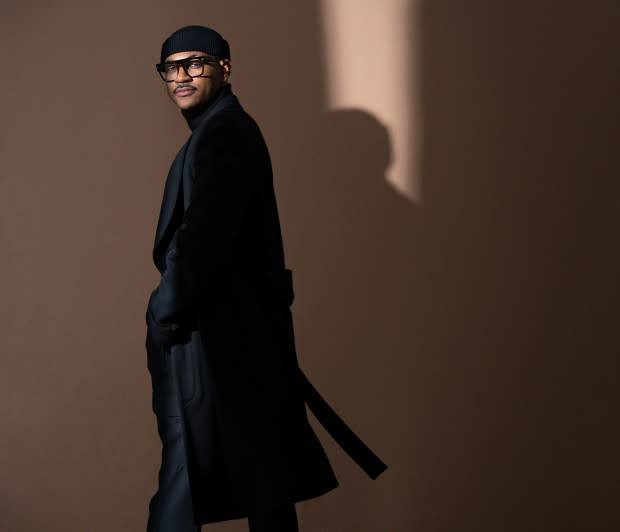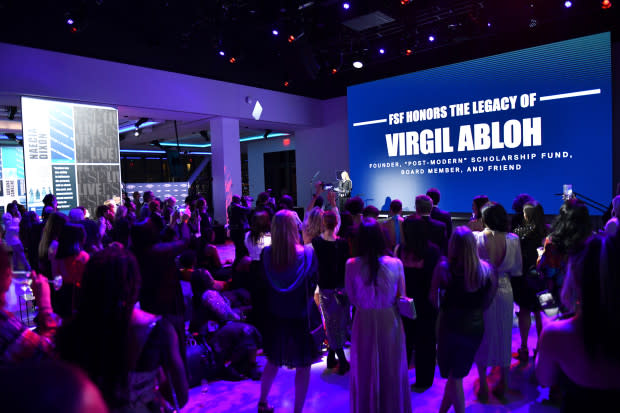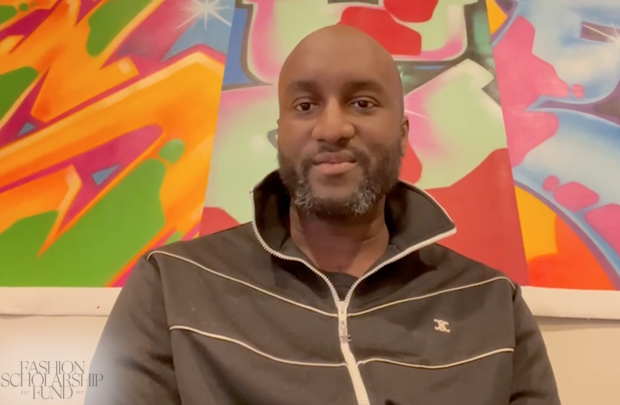How Daryl Layson Went From Struggling to Work in Fashion to Managing Virgil Abloh's 'Post-Modern' Scholarship Fund

Photo: Courtesy of Daryl Layson
In our long-running series "How I'm Making It," we talk to people making a living in the fashion and beauty industries about how they broke in and found success.
The fashion industry still has a long way to go when it comes to implementing initiatives that uplift rising Black talent. That's why the work the Virgil Abloh™ "Post-Modern" Scholarship Fund — which the late designer established in 2020 to offer career support, from mentorship to internships and scholarships, to Black students pursuing jobs in fashion — is doing remains so urgent and necessary.
Abloh worked with the Fashion Scholarship Fund (FSF), a larger education and workforce development nonprofit founded in 1937, to help build out the program, remarking at a 2020 FSF virtual campus visit attended by nearly 300 students from historically Black colleges and universities: "I see a lot of scholarship funds that are very stiff, they don't speak the language of the now. When you talk about building an infrastructure to support us being in fashion, I wanted to roll up my sleeves and do it in my language, my way and with the best people to do that, the Fashion Scholarship Fund."
Since its inception, 70 "Post-Modern" scholars have been awarded college scholarships of at least $7,500 each, and members of its inaugural class have interned at companies such as Louis Vuitton, Neiman Marcus, Tommy Hilfiger and Brandon Maxwell. Upon its launch, it was one of the first diversity-led fashion scholarships that focused on mentorship by fashion insiders. (Many more followed in its footsteps after the 2020 racial reckoning brought about by George Floyd's murder.)

Photo: Craig Barritt/Getty Images for Fashion Scholarship Fund
Daryl Layson, program manager for the "Post-Modern" Scholarship Fund, knows firsthand how important these types of resources are. He'd always had an itch to work in fashion, even when he was doing corporate communications for companies like LinkedIn and Dana Incorporated. "I've always had ideas of how I want to look, how I want to present myself," he shares. "When it came to my clothing, I always had thoughts on how I want to change or alter it." But he struggled to turn that into a career.
During his sophomore year at the University of Toledo, Layson applied for fashion-centric internships and roles, but nothing stuck. "As graduation neared, I began applying for full-time jobs and was never even considered for an interview," he explains.
Layson decided to put his aspirations on the back burner and focus on building his professional skills in corporate environments. He ultimately started his own consulting firm, where he managed social media accounts for executives and fashion companies. This helped land him a role at Neiman Marcus Group as a corporate communications manager.
Now based in Chicago, Layson is laser-focused on pouring into the students who are a part of the Fund. "For me, the work is personal," he says. "I understand firsthand what the struggle is of breaking into the industry. I didn't have any connections, resources, the financial means, the access. My journey into fashion was long and difficult."
We recently spoke with Layson about his journey in the fashion industry, how the Fund has evolved since Abloh's passing, his advice for rising fashion talent and more.
How do you feel your background as an entrepreneur and working in corporate prepared you for where you are right now?
Throughout my career, I've had my hand in a lot of different things, luckily. It allowed me to really diversify my skillset. But when I look back at my career... I launched and co-led an internship program [at Dana Incorporated], developing relationships with colleges, universities and students across the U.S. [While at Dana] I co-led a company-wide employee giving campaign, working with and engaging every individual within the company, all the way from an intern to the CEO, and I nurtured nonprofit partnerships and relationships. I led internal and executive communication plans for major company projects and initiatives. I really tapped into each and every one of [my work] experiences for the work that I'm now doing on the Virgil Abloh™ 'Post-Modern' Scholarship Fund.
How did you get connected to Virgil Abloh and the 'Post-Modern' Scholarship Fund?
Unfortunately, I never had an opportunity to meet Virgil. However, his impact has touched so many in some way, shape or form, myself included.
I first became connected to the Fashion Scholarship Fund just last year through [my] work at Neiman Marcus Group. The Fashion Scholarship Fund honored Neiman Marcus Group's CEO at their annual gala, and, as part of this honor, my colleague and I planned a 'careers in business' panel and a store tour at Bergdorf Goodman for over 120 Fashion Scholarship Fund scholars. We worked extremely close with the Fashion Scholarship Fund team on this.
In February 2023, I was unfortunately impacted by layoffs at Neiman Marcus Group. The next day, I tapped into my network and sent out emails. Peter Arnold, who's the executive director of the Fashion Scholarship Fund, responded promptly to me with an idea, and then he and I had a phone call where he just shared more about the Fashion Scholarship Fund and the Virgil Abloh™ 'Post-Modern' Scholarship Fund, which the Fashion Scholarship Fund manages. I spoke with other members of the team, and they collectively believed that I would be the perfect person to help administer and grow the Fund's impact.
As a program manager, what do you do?
Along with Peter Arnold and Marie Colletta — she's the senior director of educational programs — I help to administer the Virgil Abloh™ 'Post-Modern' Scholarship Fund. That includes student development, program experience, programming, mentoring and recruiting.
To dive a little bit deeper, I work to pair each of our current 27 'Post-Modern' scholars with mentors within the fashion industry. We work to help place them in internships or full-time jobs, depending on whether they're a current student or a grad or if they're graduating. I'm also in the middle of planning virtual programming events for the scholars.
I know back when Virgil was doing these monthly virtual events, he would invite some of his friends to come on the Zoom and talk about their career or their journey of how they got to where they got to. It's really meant to inspire and be motivational for the Virgil Abloh scholars. I'm in the middle of planning that as well.

Photo: Courtesy of Fashion Scholarship Fund
What does the recruiting aspect of your role look like?
Recruiting looks like really developing and strengthening our relationships with the various colleges and universities across the country. To apply to be a Fashion Scholarship Fund scholar, you have to submit a case study, which goes through various rounds of judging. Those that ultimately make it to the final round are selected to be a Fashion Scholarship Fund scholar.
What's most important to you as you work to bring Abloh's vision of investing into future generations to life ?
As someone who was in the same exact shoes as many of our current Virgil Abloh™ 'Post-Modern' scholars, and also just many other Black students across the country who desired to work in fashion, I understand firsthand what the struggle is of breaking into the industry. Because of that, every aspect of my role is so essentially important to me. I just know how all that we offer is so necessary — the scholarship, mentorship, development, networking, really having an advocate within your corner. I truly am honored and grateful that I get to be a part of this mission-driven work.
How has the 'Post-Modern' Scholarship Fund evolved since Abloh's passing?
One of our focuses currently is strengthening our relationship with [Historically Black Colleges and Universities] to support their Black students on campuses. We're looking to support students not only interested in fashion design, but also students who are interested in the business side of the industry. Because I know often, when it comes to fashion — and especially when you're talking to Black and brown people or students who are looking to go into fashion — we aren't even aware of the opportunities that are available on the business side. We only think about being a designer because we see that on Instagram and social media, and it's kind of glamorized.
What's the most rewarding part of your current role?
Whenever we have a scholar who lets us know that they received an offer for an internship or a full-time job, that feels like a moment of success.
Anytime that we can help facilitate or endorse them, to where they finally are able to get an opportunity in fashion, that's rewarding, because that's an experience they're going to get. That's something they can add to their resume. They'll be able to network. It's just one building block that would help launch them to that next opportunity.
What conversations do you believe should be happening right now in relation to diversity in fashion?
There should be more conversations not only about how we increase diversity in the fashion industry, but also how we increase representation in various disciplines in fashion. Not only do we need Black designers and creatives, but we also need Black lawyers, Black marketers, Black communicators, Black strategists, Black accountants, Black educators, Black supply-chain talent within the industry. I think that there needs to be a little bit more conversation on how can we diversify as a whole, in various disciplines, not just on the creative side.
How do you feel about the current state of diversity in fashion?
I believe the industry has made strides to increase diversity, but there's still much more work that needs to be done. The need to see more diverse talent in the industry is one reason why groups like the Fashion Scholarship Fund and funds like the Virgil Abloh™ 'Post-Modern' Scholarship Fund are so needed. And I'm just grateful that I get to contribute to carrying on Virgil's legacy by having an active role in supporting the diversification of the fashion industry.
What advice do you have for the next generation of fashion talent?
In the pursuit of your professional aspirations, it's crucial to have a vision of your ultimate goal, which is sort of the North Star that guides you. However, it's equally important to be flexible on that path toward your North Star, because embracing flexibility allows you to adapt, seize opportunities and really make the most of unexpected detours along the way.
This interview has been edited and condensed for clarity.
Correction: This article was updated after publishing to correct the spelling of Layson's last name, the number of recipients of the Virgil Abloh "Post-Modern" Scholarship Fund and the year of its establishment.
Never miss the latest fashion industry news. Sign up for the Fashionista daily newsletter.

